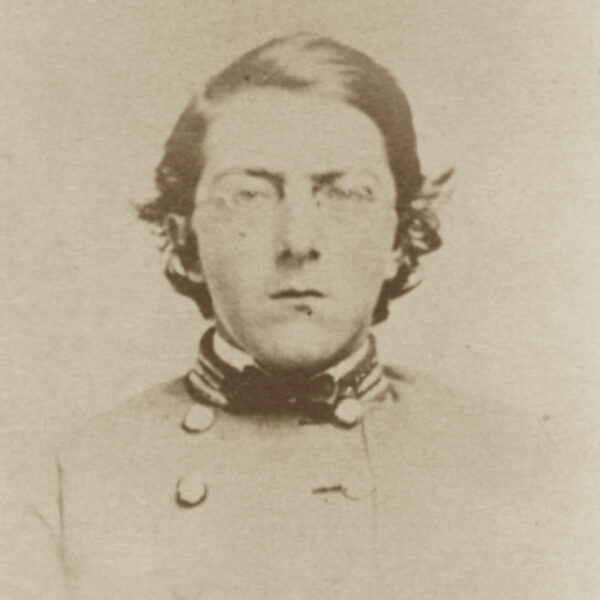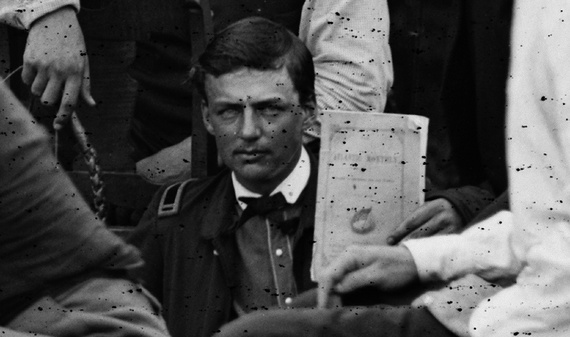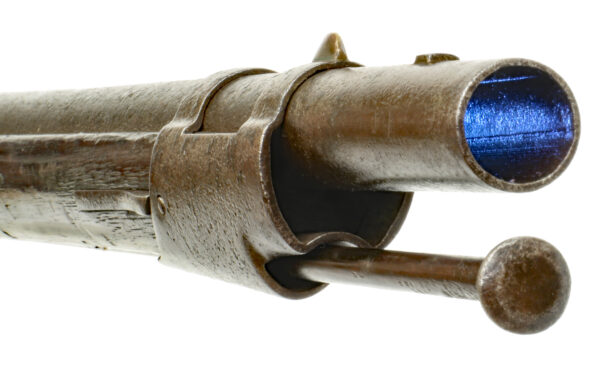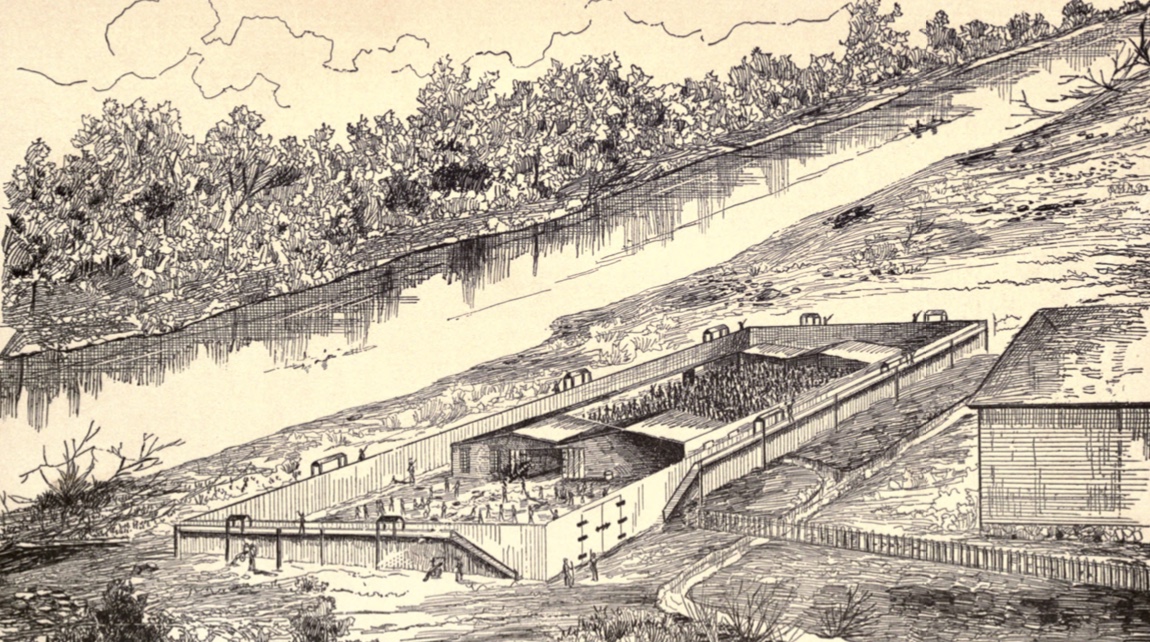
Castle Morgan prison in Cahaba, Alabama, as it appeared during the Civil War
Nearly twenty years after the end of the Civil War, Union army veteran Melvin Grigsby traveled south in hopes of locating the local woman who had aided him and other northern soldiers held at Castle Morgan prison in Cahaba, Alabama. As the following account, gleaned from Grigsby’s postwar memoir, The Smoked Yank, explains, the old soldier found the woman, Amanda Gardner, living with her daughter in Selma—and learned a lot about the many ways in which he had provided aid to enemy POWs.
In the spring of 1884, just after the opening chapter of this little book was written, … I resolved to cut loose from all communications, and devote a few weeks exclusively to the work in hand. Besides, I had often thought I would like to see that Southern country again, and that a trip over the old war path would quicken my recollection of the places and incidents about which I wished to write. Of course I visited Cahaba….
There was nothing there, not even a brick or stone, nothing but a rank growth of weeds to mark the place where the old prison warehouse stood. Only a few white families were left in the place, and these were very poor. I found a white man, George Brenner, who was one of the guards when the Yankee prisoners were there. He knew the Gardners; was living in the house that was occupied by them when I was a prisoner. It was not the house that I had watched so long and so anxiously through my hole in the fence. I had been the victim of a guard’s mistake. This man told me that the Gardners were living in Selma….
I found Mrs. Amanda Gardner living with her daughter Belle, in a rented house, in Selma. She is over 60 years old, but quite active for one of that age. She is of good family, and in every sense, a lady of culture and refinement. She is a fluent talker and uses elegant language. One of the leading men of the place told me that Mrs. Gardner had the reputation of being one of the kindest-hearted and most intelligent women in the country. The daughter, Belle, is a dressmaker, an occupation she very much dislikes, but is compelled to follow, in order to earn a living for herself and mother. Belle was only a little girl of thirteen or fourteen, in April, 1864, and wore short dresses.
Mrs. Gardner was during the war, and still is, for that matter, a thorough rebel. That is, she believed the South was right, and still believes so. She had one son killed early in the war, and another, a mere boy, was in the service and was taken prisoner at Selma, by General Wilson’s cavalry. Wilson’s men had heard of Mrs. Gardner’s kindness to Union prisoners, and as a token of appreciation, they set her boy at liberty and sent him home to his mother.
Mrs. Gardner said that when the prison was established at Cahaba, she had a large library of choice books that had been given to her by her uncle, Judge Beverly Walker, of Augusta. It was his private library, and he gave it to her when he broke up house-keeping. She said that her heart was moved to pity by the forlorn condition of the prisoners, and she began to loan them books. She had all the standard poets, in handsome binding. Scott’s, Dickens’, and Lytton’s novels, and many others in complete sets. Histories, biographies, books of travel, works on science, philosophy, and religion. A large and well-selected private library. Nearly all of these books were completely worn out. Only those in calf binding and on the less interesting subjects of philosophy, science, and religion, were left whole, and even these were much worn and soiled. I saw in a second-hand store and auction house at Selma, where she had placed them for sale, two or three dozen of those worn and soiled books, all that was left of Mrs. Gardner’s once elegant library.
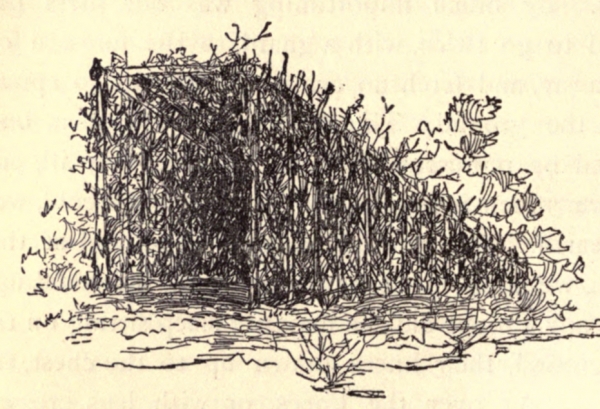
Many soldiers held captive at Castle Morgan fashioned shelters like this out of sticks and dirt.
Lending books was not all that Mrs. Gardner did. She took especial interest in those that became sick, and procured and furnished them with suitable food and medicines. Several were nursed in her own house. When winter came, many of the prisoners had no blankets and but little clothing. She gave them everything she had in her house that she could possibly spare, and procured all she could from her neighbors. Said she took up every carpet she had and cut it into pieces the size of a blanket, in order to relieve the sufferings of those poor prisoners.
These things were not done in a corner. Mrs. Gardner was arraigned, either before the church or some citizens’ meeting, on the charge of being a Union woman, and of furnishing aid and comfort to the enemy. Captain H. H. N. Henderson, who had the immediate charge of the prison, came to her relief and boldly defended her, endorsing all she had done. Had it not been for his assistance, she would doubtless have been found guilty, and banished….
Mrs. Gardner showed me over one hundred notes written by prisoners, some addressed to her, and some to Miss Belle. These tell the story of what she did, and at the same time furnish indisputable proof of it. She had two bundles of these notes containing requests and acknowledgments, but she lost one bundle when she moved from Cahaba to Selma. I did not find among those she had, any that were written by myself. She has also received since the war, a good many letters from prisoners whom she befriended, and some have remembered her with presents.
The following are samples of the notes she has kept that were sent her by Union prisoners:
Military Prison,
Cahaba, Ala., June 4th.
Mrs. Amanda Gardner: Will you please send some books to the subscribers to while away the hours of prison life.
Respectfully,
J. R. Bowen,
Chas. Reynolds,
Chas. Harris,
James Farrell.
Castle Morgan, June, 5th.
Mrs. Amanda Gardner: Please accept my thanks for the loan of this; be kind enough to send me another.
Chas. Harris,
Co. K, 13th Ills. Vol.
Cahaba Prison, March 14th.
Mrs. Gardner: If you please to send me some nice interesting book to read and I will return it with care.
B. F. Daughtery,
Private of Co. H, 37th Reg’t. Ills. Inft. Vol.
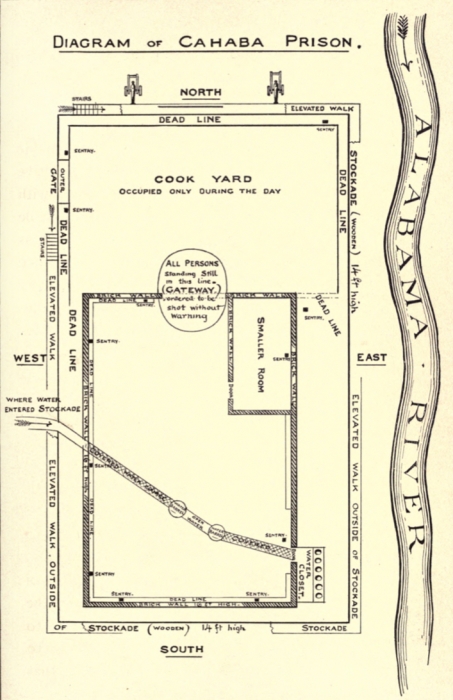
Cahaba, Ala., March 5, 1865.
Mrs. Amanda Gardner:
Kind Madam — We are all about to bid farewell to Castle Morgan. Some are already on their homeward journey; we will soon follow, rejoicing we are once more free. I feel I cannot leave without first expressing my heartfelt thanks to you for the noble and humane kindness you have so generously bestowed upon the prisoners while confined here; aiding them by the kind dispensation of your books amongst them, to while away the tedious hours of captivity both pleasantly and instructively, which otherwise would have been passed in discontent and lonesome weariness. I regret exceedingly, that there were some among them, who were so worthless, as to abuse your books in a shameful manner, but the majority appreciating the noble impulses of thy generous heart, were careful in the use of the works, knowing full well that you were making a noble sacrifice of your library for their benefit. I regret that one of the books returned to you, entitled “Famous Persons and Places,” is so badly abused; it was stolen from me, and for a long time I knew not what had become of it; after making repeated inquiries, it was returned to me in its present condition. Trusting you will pardon me, as I regret exceedingly that such a thing occurred. Be assured, kind Madam, that when we are once more surrounded by kind and loving friends, and in the enjoyment of all that makes life happy and agreeable, our thoughts will often revert to our kind Benefactress at Cahaba; many a silent prayer will be sent heavenward, that you and your lovely family may be spared the horrors of this unnatural and relentless war. Many a man will speak in glowing terms of thy noble generosity, and you will ever be remembered as a friend of the unfortunate. The day is not far distant when Peace, the great tranquilizer, will again unite our distracted country in perfect harmony and unity. The end is fast approaching when we may again enjoy all the requisites that make life both pleasant and agreeable. Civil and Religious Liberty is just as sure to rule supreme, as Jehovah guides the Universe.
May Heaven’s richest blessings descend upon you and your darling family; and when thou art called hence to that “bourne whence no traveler returns,” may you ascend to that glorious abode of angels, “where wars, and rumors of wars are never heard,” is the wish of one who is happy to subscribe himself your well wisher. Farewell.
Very respectfully,
C. W. HAYES,
Hospital Steward, 3rd. Ills. Vol. Cavalry.
Mrs. Gardner: May the blessing of God ever descend upon thy devoted head, for your kind consideration concerning the unfortunate, is the prayer of one who appreciates the noble impulses of thy generous heart.
Yours in friendship,
A Prisoner.
Address:
“Mrs. Amanda Gardner,
Cahaba, Alabama.
A lady of excellent worth, and a friend to those in distress.”
Four years after his visit to the Gardners, Grigsby learned that they had moved to New York. “Something ought to be done for Mrs. Gardner,” who was then 72, Grigsby wrote in his memoir. “She is old and poor, and is probably the only southern lady of rebel sentiments, who actuated by Christian charity alone, furnished aid and comfort to distressed Union prisoners.” It is unclear what happened from that point on to the Gardners, or whether Grigsby had any further contact with them.
